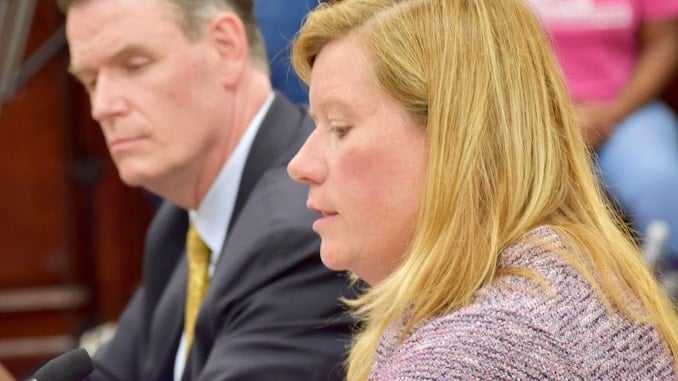No time to wait: The Rhode Island Senate needs to raise the minimum wage this year, and here’s how
Tell your Senator – tell all the Senators – that you want them to amend the 2020 Rhode Island State Budget to include the minimum wage increase the Senate already approved. The Rhode Island House of Representatives approved the 2020 Budget on Saturday that included no increase in the State’s minimum wage. This may confuse some people, because the minimum
June 24, 2019, 9:52 am
By Steve Ahlquist
Tell your Senator – tell all the Senators – that you want them to amend the 2020 Rhode Island State Budget to include the minimum wage increase the Senate already approved.
The Rhode Island House of Representatives approved the 2020 Budget on Saturday that included no increase in the State’s minimum wage. This may confuse some people, because the minimum wage is not a budget item and should be considered as a bill, not a Budget item, but I digress.
At a Budget conference held by Speaker Nicholas Mattiello (Democrat, District 15, Cranston), Majority Leader Joseph Shekarchi (Democrat, District 23, Warwick) and House Finance Chair Marvin Abney (Democrat, District 73, Newport)[note]Representative Marvin Abney should be particularly ashamed, as the community he represents in Newport is a low-income community that would certainly benefit from a minimum wage increase and will suffer further economic privation without such an increase.[/note], I asked the Speaker why there was no increase this year.
“Every year that we don’t increase the minimum wage the buying power the lowest income Rhode Islanders goes down, due to inflation,” I said. “So this being a consumer friendly budget, as you said and your press release, how does that square with the about the 27 percent of Rhode Islanders who would benefit from the minimum wage increase?”
Mattiello’s answer was a recital of anti-worker arguments annually presented by pro-business extremists at committee hearings to consider increasing the minimum wage.
“Most issues have two sides and you fairly bring up one side of the issue,” said the Speaker. “You have to do a balancing. I think we’ve increased the minimum wage [the] last 6 of 7 years. In the past we’ve gotten requests [from business lobbyists to] just hold it off a little bit, let us adopt the cost into our structures. We have direct care workers and D/D providers that are not getting much more than that. Once you increase the minimum wage you put a lot of pressure on those industries and their ability to attract good workers. [It is] much easier to work in McDonald’s than in those industries.
“So the state has to balance what it could afford to fund in
any given budget with what the minimum wage is so that resources get spread appropriately,” continued Mattiello. “I make personal note of the fact that a lot of companies are going to automation with the minimum wage increasing. I mean, we’ve been saying for years they’re going to cut jobs. They are doing it. You don’t have to look very hard to figure that out.
“So with the economy kind of leveling off a little bit it’s just time to let the figures get absorbed into the economy and we will absolutely look at the minimum wage,” concluded the Speaker. “We always look at that very favorably and there’s usually a good argument for considering that. We’re just taking a short break. We’ll be back in January.”
“Just following up,” I countered, “We’ll be the lowest in New England at this point because Massachusetts Connecticut are going up and I think every other state is going to be higher than Rhode Island in New England.” [Note: the lowest in New England in New Hampshire, at $7.75, but who wants to be New Hampshire?]
“I’m not sure if those are the facts but we usually try to be consistent with theirs,” said Mattiello. “If you’re looking at Connecticut and and Boston, Boston has a much higher cost of living than Rhode Island, so it’s probably appropriate that we trail them a little bit, not a lot, but a little bit. Your cost of living and your wages have to have some relationship to one another.”
Speaker Mattiello’s economic assessment stands in stark contrast to that of Senate Judiciary Committee Chair Erin Lynch Prata (Democrat, District 31, Warwick, Cranston). Under her leadership, the Senate passed legislation, S0174A, that would increase the hourly minimum wage to $11.50 per hour starting on January 1, 2020.
“With the costs of living rising each year while most people’s wages remain stagnant, it is important that we help our hard-working residents who are struggling to pay for daily living expenses for themselves and their families,” said Senator Lynch Prata. “This raise in the minimum wage is a good step in ensuring that our residents have enough money to pay for a roof over their heads and put food on their table.”
If the Senate is truly committed to helping struggling, low-income “hard-working residents” and their families, then they should not approve the 2020 Budget submitted by the House for their consideration without amending it to include the minimum wage increase they previously approved.
But to do this, Senate leaders and your Senator need to hear from you. I have a handy Senate contact list available here.
Tell your Senator – tell all the Senators – that any year without an increase in the minimum wage is a year that low-income Rhode Islanders will see their buying power decrease, their debts rise and their dreams diminished.
UpriseRI is entirely supported by donations and advertising. Every little bit helps:
Become a Patron!







